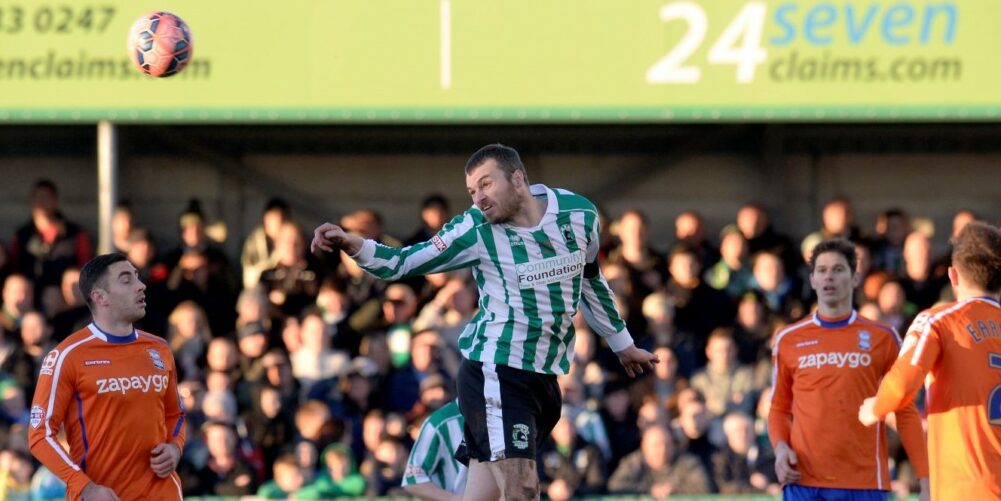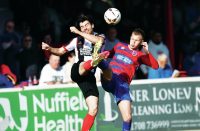Catch up here on The Non-League Paper’s new Non-League Icons series as Chris Dunlavy analyses how striker Robbie Dale became a Blyth Spartans legend…
Enigmatic and extravagantly talented, Robbie Dale is to Blyth Spartans what Eric Cantona once was to Manchester United.
“Robbie isn’t an easy bloke to describe,” muses Stephen Turnbull, who spent the best part of a decade playing alongside Dale at Croft Park.
“But imagine him on a night out with the lads. We’d all be sat there with our pints and Robbie would come back from the bar with a pina colada – umbrella, cherry on top, the lot.

“It’s not that he was an extrovert. Far from it. He was just a completely unique character who did things his own way.”
Bar a solitary season at Whitley Bay, Dale has spent the last 15 years with Spartans, scoring 210 goals in a club-record 672 games.
Those numbers, though, are garnish. It is the gasps, grins and dropped jaws that have made the 35 year-old a hero in this windswept Northumberland outpost.
Feints, chops, spectacular goals, all pulled off with easy grace. Languid dribbles reminiscent of Chris Waddle, a player Dale resembles in both gait and stature.
“I’ve played with some good players, like Adam Boyd and Joe Porter at Hartlepool,” says Turnbull, who also played in the EFL for Bury and Rochdale.
Brilliant
“But I’d put Robbie above any of them. He’s great at finishing. Brilliant at free-kicks. He can go past people like they aren’t there. We all used to say he had a bionic arm. Once he got it up, you couldn’t get the ball off him, a bit like Gazza.”
Never was that better illustrated than when Blyth welcomed Birmingham City to Croft Park for an FA Cup Third Round tie in January 2015.
Dale was at the peak of his powers then, midway through a season that would yield 22 goals and multiple player of the year awards.
Arm extended, he weaved across the 18-yard box, scattering bamboozled Blues players like Jonah Lomu ploughing through a playground. A speared finish, his second goal of the game, wasn’t enough to scalp the Championship side, but it proved Dale belonged in their class.
“Robbie made good defenders look like pub players that day,” said Turnbull. “But he could make anyone look silly. I remember when we played Vauxhall Motors and he chopped this one kid four times. If that lad didn’t retire after the game, he should have.”
Dale’s legend began on day one, a hat-trick on debut against Wakefield & Emley in March 2005 the precursor to a 37-goal season that prompted widespread Football League interest.

Oxford United, then managed by the late Jim Smith, even proffered a contract. Dale, though, rejected terms, returned to Blyth and Non-League and would never get the opportunity again.
That he possessed the talent is unquestionable. Dale, says Turnbull, was “levels and levels” above his Step 6-7 comfort zone.
Yet those who know him say the disciplined life of a professional sportsman was no place for a quiet character who relished the comfort zone.
“Non-League football is perfect for Robbie,” says Tom Wade, who managed Spartans from 2012 to 2016. “Because you train, you play and you go home. That’s it. All the off-field stuff – the discipline, doing analysis – he wouldn’t have coped with that. He isn’t ruthless enough.”
Turnbull agrees. “It sounds strange but he almost had too much talent to be a pro,” he adds. “If he’d gone to a League club, with coaches saying ‘Pass here, move there, do this, do that’, it wouldn’t have worked.
“It’s like when Lee Clark got the Blyth job. It was never going to work in a million years. He’d come from full-time football with set ideas about fitness levels and preparation. Robbie doesn’t fit that mould at all.”
Andy Cole, the former England striker, once said of Cantona that he was the only player spared Sir Alex Ferguson’s infamous hairdryer.
“He was the only player I saw who the manager never had a go at. We all went to a film premiere and were told to wear black ties. Eric turned up in a cream lemon suit with Nike trainers. The manager told him that he looked fantastic!”
Fergie knew that imposing conformity would serve only to inhibit his best player. Dale, sensitive and naturally introverted, is cut from similar cloth.
Some managers were unwilling to yield. Steve Cuggy, who replaced Mick Tait in 2011, even expelled Dale from the club in a row over fitness. Wade made no such error.
“Robbie is unique as a person,” says Wade. “Pretty deep. He’s very caring and takes things to heart. If you have a go at him, he’ll go into his shell – and that’s disastrous for the team.
Doggies
“So you leave him alone and accept that he might sit on the left wing doing nothing for 85 minutes. But in the other five, he’ll do something brilliant.
“I wouldn’t even let him defend. What’s the point in having a player so talented doing doggies backwards and forwards? I gave him a luxury role because that’s where he won us games.”
To some, those traits are evidence of selfishness or a bad attitude. In 2015, the Telegraph even ran an interview with Dale proclaiming that he didn’t care about football. Wade, though, says that is way wide of the mark.
“It’s the opposite,” he insists. “He almost cares too much. But because he’s such a quiet person, he bottles it up.
“That’s why making him captain was the best thing I ever did. It allowed him to show that caring side. He was a changed person after that. His mam actually wrote me a lovely letter saying how much he’d come out of himself.”
Today, Dale remains a totemic figure at Blyth Spartans. “I’ve followed the club for many years,” says Wade. “And he’s the best player I’ve seen. No question.”
Turnbull concurs. “The best thing I can say about Robbie is that when I stood next to him in the tunnel, I thought we could beat anyone. Even Birmingham. Because when you had Robbie, you had magic.”
Make sure you get your copy of The Non-League Paper from this weekend for great features and all the latest news in one place on the impact of the coronavirus crisis on society and football.
In shops on Sundays and Mondays, The NLP is always available as a pound-busting digital edition and full replica of the printed paper from midnight on Saturdays. Save cash on single issues, even more on longer deals and the pages still rustle too!
Images courtesy of The Non-League Paper





















